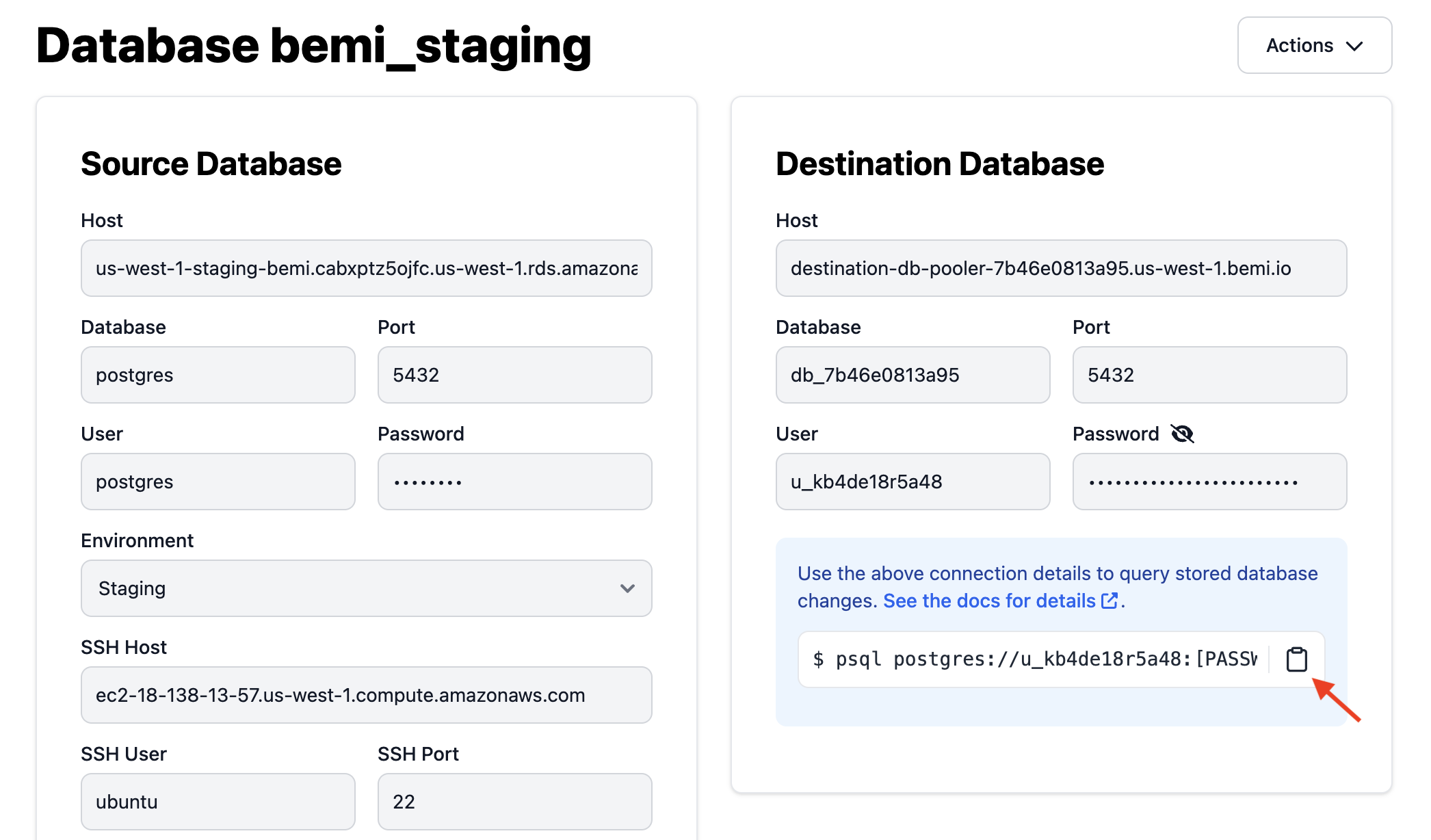SQLAlchemy
BemiHQ/bemi-sqlalchemyBemi plugs into SQLAlchemy and PostgreSQL to track database changes automatically. It unlocks robust context-aware audit trails and time travel querying inside your application.
This Python package is a recommended SQLAlchemy integration, enabling you to pass application-specific context when performing database changes. This can include context such as the 'where' (API endpoint, worker, etc.), 'who' (user, cron job, etc.), and 'how' behind a change, thereby enriching the information captured by Bemi.
See this example repo as a SQLAlchemy and FastAPI Todo app that automatically tracks and contextualized all changes.
Prerequisites
- PostgreSQL 14+
- SQLAlchemy
Installation
- Install the Python package
pip install bemi-sqlalchemy
- Generate an Alembic migration file to add lightweight PostgreSQL triggers for passing application context with all data changes into PostgreSQL replication log
alembic revision -m "Init Bemi"
And add the following code:
...
def upgrade() -> None:
Bemi.migration_upgrade()
def downgrade() -> None:
Bemi.migration_downgrade()
- Run the Alembic migration
alembic upgrade head
Usage
Now you can easily specify custom application context that will be automatically passed with all data changes:
from bemi import Bemi
from sqlalchemy import create_engine
engine = create_engine(DATABASE_URL)
Bemi.set_context({ "process": "MyWorker" })
with engine.connect() as connection:
connection.execute("INSERT INTO ...")
connection.execute("UPDATE ...")
Application context:
- Is bound to the current execution thread within an HTTP request.
- Is used only with
INSERT,UPDATE,DELETESQL queries performed via SQLAlchemy. Otherwise, it is a no-op. - Is passed directly into PG Write-Ahead Log with data changes without affecting the structure of the database and SQL queries.
Application context will automatically include the original SQL query that performed data changes, which is generally useful for troubleshooting purposes.
FastAPI
Add a middleware to your FastAPI app to automatically pass application context with all tracked database changes made within an HTTP request:
from bemi import BemiFastAPIMiddleware
from fastapi import FastAPI
app = FastAPI()
app.add_middleware(
BemiFastAPIMiddleware,
set_context=lambda request : {
"user_id": current_user(request),
"endpoint": request.url.path,
"method": request.method,
}
)
Data change tracking
Local database
To test data change tracking and the SQLAlchemy integration with a locally connected PostgreSQL, you need to set up your local PostgreSQL.
First, make sure your database has SHOW wal_level; returning logical. Otherwise, you need to run the following SQL command:
-- Don't forget to restart your PostgreSQL server after running this command
ALTER SYSTEM SET wal_level = logical;
To track both the "before" and "after" states on data changes, please run the following SQL command:
ALTER TABLE [YOUR_TABLE_NAME] REPLICA IDENTITY FULL;
Then, run a Docker container that connects to your local PostgreSQL database and starts tracking all data changes:
docker run \
-e DB_HOST=host.docker.internal \
-e DB_PORT=5432 \
-e DB_NAME=[YOUR_DATABASE] \
-e DB_USER=postgres \
-e DB_PASSWORD=postgres \
public.ecr.aws/bemi/dev:latest
Replace DB_NAME with your local database name. Note that DB_HOST pointing to host.docker.internal allows accessing 127.0.0.1 on your host machine if you run PostgreSQL outside Docker. Customize DB_USER and DB_PASSWORD with your PostgreSQL credentials if needed.
Now try making some database changes. This will add a new record in the changes table within the same local database after a few seconds:
psql postgres://postgres:[email protected]:5432/[YOUR_DATABASE] -c \
'SELECT "primary_key", "table", "operation", "before", "after", "context", "committed_at" FROM changes;'
primary_key | table | operation | before | after | context | committed_at
-------------+-------+-----------+----------------------------------------------------+-----------------------------------------------------+-------------------------------------------------------------------------------------------+------------------------
26 | todo | CREATE | {} | {"id": 26, "task": "Sleep", "is_completed": false} | {"user_id": 187234, "endpoint": "/todo", "method": "POST", "SQL": "INSERT INTO ..."} | 2023-12-11 17:09:09+00
27 | todo | CREATE | {} | {"id": 27, "task": "Eat", "is_completed": false} | {"user_id": 187234, "endpoint": "/todo", "method": "POST", "SQL": "INSERT INTO ..."} | 2023-12-11 17:09:11+00
28 | todo | CREATE | {} | {"id": 28, "task": "Repeat", "is_completed": false} | {"user_id": 187234, "endpoint": "/todo", "method": "POST", "SQL": "INSERT INTO ..."} | 2023-12-11 17:09:13+00
26 | todo | UPDATE | {"id": 26, "task": "Sleep", "is_completed": false} | {"id": 26, "task": "Sleep", "is_completed": true} | {"user_id": 187234, "endpoint": "/todo/complete", "method": "PUT", "SQL": "UPDATE ..."} | 2023-12-11 17:09:15+00
27 | todo | DELETE | {"id": 27, "task": "Eat", "is_completed": false} | {} | {"user_id": 187234, "endpoint": "/todo/27", "method": "DELETE", "SQL": "DELETE FROM ..."} | 2023-12-11 17:09:18+00
Remote database
Go to Bemi.io Dashboard UI and follow the instructions to connect your hosted PostgreSQL database in a few seconds.

Once the project infrastructure is provisioned, it'll automatically ingest and store all data changes stitched with an application context in a separate serverless PostgreSQL database. You can test the connection by running the following command:
psql postgres://[USERNAME]@[HOSTNAME]:5432/[DATABASE] -c \
'SELECT "primary_key", "table", "operation", "before", "after", "context", "committed_at" FROM changes;'
primary_key | table | operation | before | after | context | committed_at
-------------+-------+-----------+----------------------------------------------------+-----------------------------------------------------+-------------------------------------------------------------------------------------------+------------------------
26 | todo | CREATE | {} | {"id": 26, "task": "Sleep", "is_completed": false} | {"user_id": 187234, "endpoint": "/todo", "method": "POST", "SQL": "INSERT INTO ..."} | 2023-12-11 17:09:09+00
27 | todo | CREATE | {} | {"id": 27, "task": "Eat", "is_completed": false} | {"user_id": 187234, "endpoint": "/todo", "method": "POST", "SQL": "INSERT INTO ..."} | 2023-12-11 17:09:11+00
28 | todo | CREATE | {} | {"id": 28, "task": "Repeat", "is_completed": false} | {"user_id": 187234, "endpoint": "/todo", "method": "POST", "SQL": "INSERT INTO ..."} | 2023-12-11 17:09:13+00
26 | todo | UPDATE | {"id": 26, "task": "Sleep", "is_completed": false} | {"id": 26, "task": "Sleep", "is_completed": true} | {"user_id": 187234, "endpoint": "/todo/complete", "method": "PUT", "SQL": "UPDATE ..."} | 2023-12-11 17:09:15+00
27 | todo | DELETE | {"id": 27, "task": "Eat", "is_completed": false} | {} | {"user_id": 187234, "endpoint": "/todo/27", "method": "DELETE", "SQL": "DELETE FROM ..."} | 2023-12-11 17:09:18+00
See Destination Database for more details.
License
Distributed under the terms of the LGPL-3.0. If you need to modify and distribute the code, please release it to contribute back to the open-source community. hide_title: true